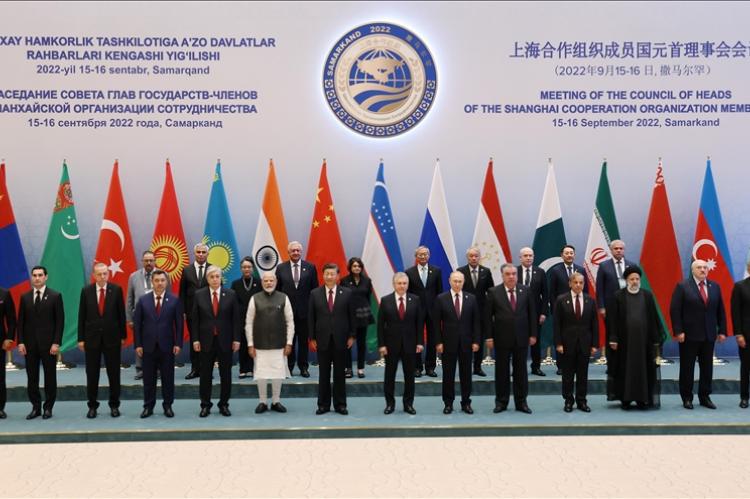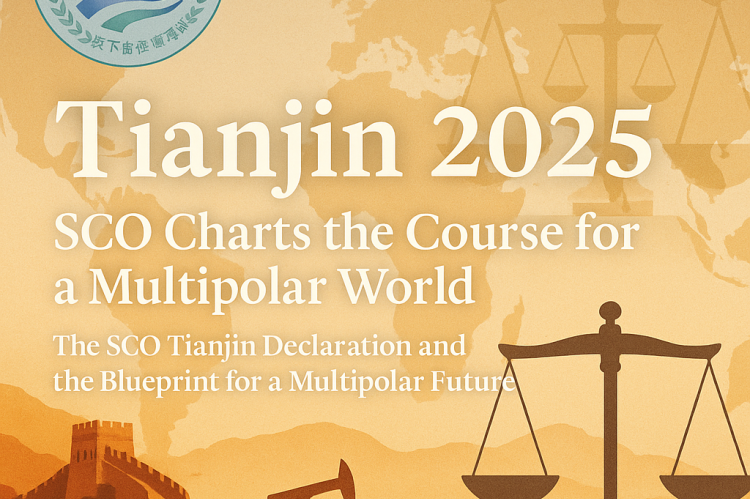Tianjin 2025: The SCO Charts the Course for a Multipolar World
China’s Summit at the Crossroads of History
By: Omar Silva: Editor/Publisher
National Perspective Belize – Special International Report
Belize City: Tuesday, 2nd September 2025: The 25th Summit of the Shanghai Cooperation Organization (SCO), held in Tianjin, China, unfolded at a moment of seismic shifts in global politics. With wars raging in Europe and the Middle East, a re-militarized United States asserting itself in the Caribbean, and widening cracks in the Western-led economic system, the SCO’s gathering could hardly have been more consequential.
What emerged was the Tianjin Declaration — a wide-ranging political statement paired with the SCO Development Strategy 2026–2035 — that sets a long-term trajectory for the bloc. Together with the bold speeches of leaders like Xi Jinping, Vladimir Putin, and Narendra Modi, this summit signaled not only the consolidation of the SCO as Eurasia’s largest security-economic alliance, but also its ambition to redefine global governance in multipolar terms.
Xi Jinping: A Blueprint for Multipolarity
China’s President Xi Jinping was both host and principal architect of the summit’s narrative. In two major addresses, he laid out a blueprint for the SCO’s next decade and, by extension, a model for a new global order.
- Security Architecture. Xi pressed for the immediate activation of the SCO Universal Center for Countering Security Challenges and Threats in Tashkent and the SCO Anti-Drug Center in Dushanbe. He described these as permanent institutions to counter terrorism, narcotics trafficking, cyber-crime, and organized crime — the very issues Western coalitions often use as justification for intervention.
- Financial Sovereignty. In what may be the SCO’s most consequential pivot, Xi urged the creation of an SCO Development Bank, echoing the earlier trajectory of the Asian Infrastructure Investment Bank. He pledged 2 billion yuan in grants for 2025 and an additional 10 billion yuan in loans to SCO states through the Interbank Consortium over the next three years.
- People-Centred Development. Xi unveiled a suite of “small but beautiful” projects: 100 community-level development schemes, 10 Luban Workshops, 10,000 training opportunities, and a doubling of SCO-specific university scholarships. This was not rhetoric but a commitment of tangible resources to underpin the SCO’s social legitimacy.
- Technological Frontiers. At the “SCO-Plus” dialogue, Xi launched a Global Governance Initiative, anchored in sovereign equality and true multilateralism. He announced three platforms (for energy, green industry, and the digital economy) and three new centres (for science & technology innovation, higher education, and vocational training). He proposed a dedicated AI Cooperation Center and invited partners to access China’s BeiDou satellite navigation system and participate in the International Lunar Research Station.
Xi’s message was unmistakable: multipolarity must be built, not just declared, and the SCO is the scaffolding.
Putin: Toward an Independent Financial Order
Russian President Vladimir Putin complemented Xi’s proposals with a financial counterpunch. He urged the bloc to:
- Issue joint SCO bonds,
- Establish a shared payment and depository system,
- And create a bank for joint investment projects.
His rhetoric was blunt: these tools are not just about cooperation, but about de-risking the SCO economies from Western sanctions and dollar dependence. In Putin’s framing, Eurasia must build its own “system of stability and security” free from Western leverage.
Modi: A Voice for Security and Fairness
India’s Prime Minister Narendra Modi carved out a distinct position. His message revolved around three pillars: Security, Connectivity, and Opportunity.
- He called for “no double standards” in combating terrorism, directly referencing recent attacks in India and Pakistan.
- He welcomed the SCO’s AI cooperation framework, aligning India’s booming digital economy with regional initiatives.
- At the same time, Modi’s engagement — despite border tensions with China and deepening defence ties with the U.S. — signaled New Delhi’s pragmatic balancing act: inside the SCO tent but on its own terms.
The Tianjin Declaration: Institutionalizing Multipolarity
The Tianjin Declaration is more than a ceremonial statement. It codifies the SCO’s intent to:
- Promote an “equal and orderly multipolar world” rooted in UN-centred multilateralism.
- Advance economic globalization that is “universally beneficial and inclusive,” rejecting sanctions and protectionism.
- Deepen cooperation in green energy, AI governance, food and energy security, digital trade, and infrastructure connectivity.
- Condemn terrorism in all forms and intensify collaboration against its financing, recruitment, and ideological spread.
Paired with the 2035 Development Strategy, the declaration creates a long-term roadmap for Eurasian integration — one that explicitly offers an alternative to Western models of alliance and finance.
Beyond Rhetoric: From Talk to Institutions
For years, critics dismissed the SCO as a “talk shop.” Tianjin 2025 challenges that notion:
- Permanent security centres in Central Asia give it an operational backbone.
- Financial architecture proposals hint at a parallel monetary ecosystem.
- Concrete development pledges anchor the SCO in the lives of citizens, not just elites.
If implemented, these steps would transform the SCO from a forum into a functional bloc — not unlike the EU or NATO in their formative decades, but with Eurasian characteristics.
The Global Order at Stake
The Tianjin summit unfolded as the Trump Administration flexed muscle in the Caribbean, deploying warships and a nuclear submarine off Venezuela’s coast. Washington insists this is anti-narcotics enforcement; regional observers see it as gunboat diplomacy — the Monroe Doctrine retooled for the 21st century.
Juxtaposed against that backdrop, the SCO’s declaration of a “multipolar world order” acquires sharper resonance. It is not a sudden “Big Bang,” but the steady construction of an alternative grammar of power:
- Security not under U.S. command,
- Finance not dollar-dependent,
- Technology not governed solely by Silicon Valley,
- And legitimacy not flowing exclusively from Western institutions.
What It Means for Smaller Nations
For countries like Belize and its Caribbean neighbours, the Tianjin outcomes may seem distant. Yet the fault lines of the emerging order will ripple globally:
- Trade & Finance: An SCO Development Bank or joint bonds could eventually offer alternative sources of credit outside the IMF/World Bank orbit.
- Technology Standards: SCO initiatives in AI, digital economy, and satellite navigation could reshape global tech rules, forcing small states to choose which systems to adopt.
- Diplomatic Leverage: As multipolar blocs gain weight, the bargaining space for small nations widens — but so does the pressure to pick sides.
Conclusion: An Evolution, not a Revolution
The Tianjin Summit did not topple the U.S.-led world order overnight. But it institutionalized the SCO’s role as the core of a Eurasian counterweight and provided the clearest articulation yet of a multipolar doctrine.
If the Monroe Doctrine once defined hemispheric dominance, the Tianjin Declaration may in time be remembered as the manifesto of a post-hegemonic world. The real test will be whether the SCO can translate grand visions into operational realities — banks that lend, centres that act, and projects that touch lives.
For now, what is certain is that Tianjin 2025 marked the SCO’s coming of age — and with it, the further unravelling of the old order.
- Log in to post comments


